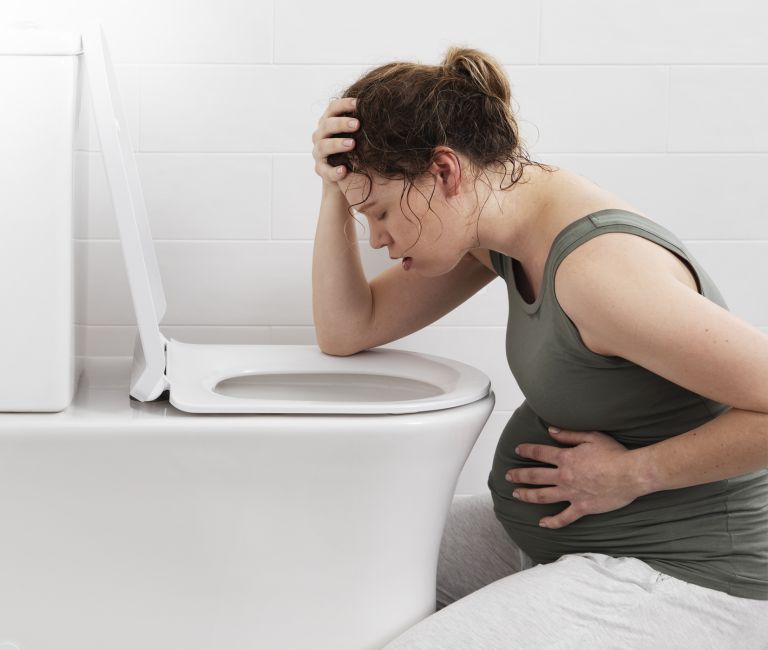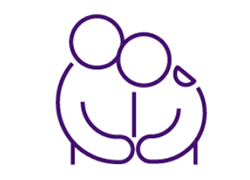Find support in Western NSW
If you are pregnant, experiencing nausea and vomiting and finding it hard to eat and drink, or it’s impacting your day-to-day life, you need to seek advice as soon as possible. Hyperemesis Gravidarum (HG) can have a huge impact on your emotional, mental and physical health, so it is important you get the support and treatment you need.
There is support available for you in Western NSW through your local:
- General practitioner (GP)
- Hospital emergency department
- Antenatal clinic or maternity unit
- Aboriginal maternal & infant health service (AMIHS)
- Outpatient services (including appointments or hospital day stays for HG treatment and IV fluids)
- Private obstetrician
You health care team may offer you advice or treatment options based on your specific needs, symptoms and the severity of your condition. These options might include:
- Vitamins or supplements
- Prescription medications
- Intravenous (IV) fluids
- Psychosocial support (through a social worker)
- Advice about your activity levels, diet and fluid intake (through a dietician)
To connect with the services above that may be offered through the public health system in Western NSW, contact your local health service.
Tips and resources to help manage HG
Connecting early with the right support team is the most important thing pregnant women experiencing severe nausea or vomiting should do. However the information, tips and resources below may also help manage the symptoms of HG and the social and emotional difficulties it can result in.
Eating with Hyperemesis Gravidarum (HG) can be difficult. It is ok to only eat foods which will stay down. You may need nutritional supplements, speak to your local health professional for advice.
Foods which may be easier to tolerate when suffering from HG:
 Cold, low odour foodsFor example - Bread, cereal, pasta, rice, etc. |
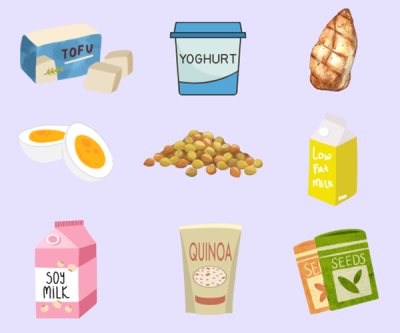 High protein foodFor example - Tofu, milk, eggs, yoghurt, etc. |
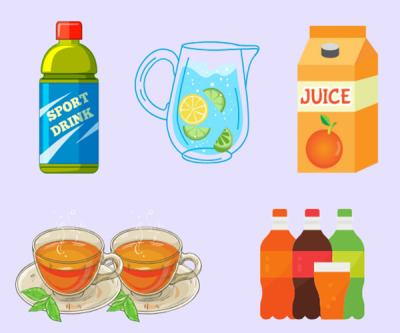 Cold, clear or carbonated fluidsFor example - Sports drinks, soft drink, juice, etc. |
Other tips to keep in mind:
- Hunger can make nausea worse.
- Eat small amounts of food regularly.
- Eat a mouthful whenever you can.
- Have someone else prepare your meals.
Constipation is when bowel actions are difficult to pass or less frequent. It is a common side effect of Hyperemesis Gravidarum which can be caused by normal pregnancy hormones, anti-nausea medication and/or low food/fluid intake.
Talk with your pregnancy caregivers about what the appropriate plan for constipation management is for you. Pregnancy safe laxatives may be required.
The Bristol stool form scale below is useful for understanding whether your bowel actions are normal or you may need assistance. You should aim for types 3 or 4 on the scale, at least three times a week.
 Type 1Separate hard lumps, like nuts |
 Type 2Lumpy and sausage-like |
 Type 3Sausage shape with cracks |
 Type 4Like a smooth soft sausage or snake |
 Type 5Soft blobs with clear-cut edges |
 Type 6Mushy consistency with ragged edges |
 Type 7Liquid consistency with no solid pieces |
When nausea and vomiting become severe, it can be hard to drink and eat enough. This may lead to dehydration (lack of fluid in the body) and cause weight loss and vitamin deficiencies.
Tips to stay hydrated include:
- Have small sips of your chosen drink every 15 minutes.
- Have your most nourishing (high calorie) fluids 30 minutes after anti-nausea medications (for example: milk, juice, soft-drink).
- Try sugary or carbonated (fizzy) drinks.
- Sometimes icey, slushy or very cold drinks can help.
- Try high fluid foods (for example: watermelon, grapes, pineapple).
- Avoid eating and drinking at the same time.
- Avoid drinks with strong odours (for example: coffee).
Stomach acid from vomiting can erode your teeth, which can lead to sensitivity. Below are some tips to help keep your teeth strong and healthy:
- Wash out your mouth with water each time you vomit.
- Brushing your teeth too soon after vomiting can make erosion worse. Wait 30 minutes before brushing.
- Mixing one teaspoon of bicarb soda in a glass of water and using as a mouthwash, to help neutralise stomach acid.
- Toothpaste and normal toothbrushes may make your nausea worse. Change your toothpaste to find a tolerable texture and taste. Try using a small toddler-sized toothbrush.
- See a dentist during or after pregnancy for early detection of issues caused by vomiting.
The more supports you have around you, the better your outcomes will be.
Contact your local NSW Health social workers, who can provide a range of supports to help women experiencing HG during their pregnancy, including:
Get a clinical support team around you A social worker can work with your GP to help you get access to a range of health professionals and the best treatment options. MotherSafe NSW is a free telephone service for the women of NSW that can provide counselling and advice on medications to manage nausea and vomiting in pregnancy. They can be contacted on 1800 647 848. |
Finances You might be eligible for Job Seeker payments, extra Child Care Subsidies or unpaid special parental leave. A social worker can help you find out what’s available for you. |
Home help A social worker can help you work out if there are practical supports available to help you and your family cope with your change in health. |
Mental wellbeing Living with HG during a pregnancy can be incredibly hard. Social workers can provide emotional support and counselling. Other support options include:
|
You are not alone - hear from local women
Women who experience severe morning sickness or HG during their pregnancies can sometimes feel isolated or alone. Below local women from Western NSW have shared their stories, in the hope they may help other women who are going through a similarly difficult time.
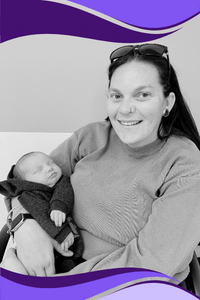
Sarah is sharing her story of dealing with HG during her pregnancy with son, Kash.
“I had HG my entire pregnancy. It had a huge impact, not only on me but my whole family. I was fortunate to have good family support so they helped me with my older children as well as household duties as I just couldn’t function.
I was housebound. I live 20 minutes from our local hospital and being in the car made me so much sicker so I couldn’t even get to the hospital to get the treatment I needed as it was just too much.
I had to give up my job as I couldn’t work which caused financial strain on our family.
I couldn’t attend family gatherings so I felt like I missed out on so much and couldn’t get the enjoyment from things I normally would get.
My advice to other women who are challenged with HG is to ask for help and use what supports are available to get the help you need. Without this support I don’t know how I would have got through the pregnancy.”
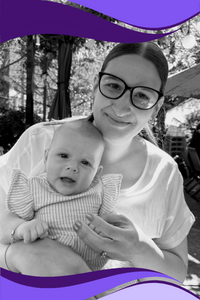
Ines is sharing her story of dealing with HG during her pregnancy with daughter, Nora.
“I think my pregnancy started off normally, but it was about week 8 that the frequent vomiting started. That Christmas was the worst I’ve ever had. Surrounded by friends and family but experiencing waves and waves of nausea. I stuck it out until the New Year, but after seeing my amazing GP I was put in touch with the local ambulatory care services for ongoing care and fluid maintenance.
I was in and out of hospital almost every day, going to hospital more than I was working. I tried to work through the HG, I would be on a video conference or writing emails while at the hospital getting fluids and medicine, but there came a time when it was just no longer possible.
At 35 weeks the effects of HG would again find me in hospital needing monitoring and constant fluid infusions. It was during this time that I was completely done mentally and physically. I had given up and was no longer eating or drinking. I was ready for it to all be over, I wasn’t thinking about anyone or anything else at this time, just that I was in so much pain and was so sick, I couldn’t see anything other than that. I was ready to die, I wanted to die, I did not and could not do any of it any longer.
Thankfully my partner and family could see how much I was struggling and advocated for me with the treating team, who could also see how I was feeling and had planned for a c-section at 36weeks, only 4 days later! That day came and it was surreal. it was like any other - wake up vomit, get dressed, vomit, drive to the hospital feeling like you need to vomit - but that day at 2:50pm I had my baby. I experienced HG and all its detrimental effects right up until 2 days after I had my baby, but on that 3rd day I was hungry, had a cheese toasty which stayed down and even after a caesarean - I FELT SO GOOD!”
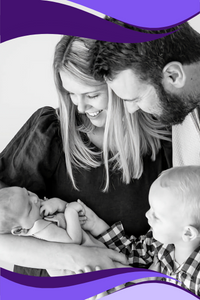
Kristie-Lee is sharing her story of dealing with HG during her pregnancy with son, Henry.
“I kept my journey with HG very private, only sharing my experience with my nearest and dearest. When I felt strong enough to share, I carefully selected the parts of the narrative that I told. I wanted to be honest about my pregnancy journey because, for me, it wasn't positive or glamorous. It was a fight. Every single day.
For some women, pregnancy makes them feel incredible, beautiful and powerful, but for some, like me, it can make you feel worthless, hopeless, powerless, depleted and guilty. I love hearing other women talk about their pregnancy experiences as beautiful and enjoyable because it should be! I admit, however, it saddens me that I'll never know a pregnancy without HG or Antenatal Depression. While I feel robbed, I'm so glad to hear that women have a nice experience where they feel connected with their babies and their bodies.
My second pregnancy journey was one of the hardest and darkest things I've ever experienced. I was completely disconnected in every way possible, I didn't trust my body and hated having a lack of control (thank you perfectionism). Without my village of health professionals, family and friends, I wouldn't have walked out the ward doors.
I know how blessed I am to have experienced pregnancies of my own and to have two beautiful little children of my own, things that I know others hope and pray for. I'm grateful, but to say I didn't struggle would be a complete lie. I can't express how important it is to continue supporting women who experience HG. I'm forever grateful for everyone who played a part in getting me through what was a very long and challenging pregnancy.”
